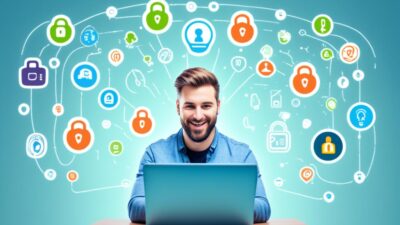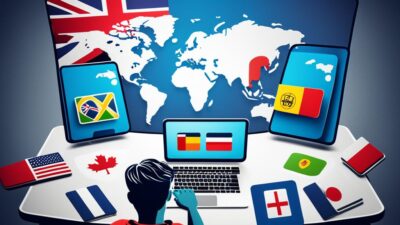What Does a VPN Do? | Secure Online Privacy & Access

A VPN is a powerful tool that boosts our online privacy, security, and access to restricted content. This article will look closely at the benefits of using a VPN. We’ll learn how VPNs keep our internet use private and open access to network areas.
We’ll also cover the tech side of VPNs. This includes the types of VPN protocols and how to choose a good VPN provider. Plus, we’ll talk about the good and bad points of using a VPN. And we’ll see how people and companies can use VPNs in real life.
Introduction to VPNs
A VPN is a private connection from your device to the internet. It uses a secure server to keep your internet use private. This way, your Internet Service Provider (ISP) and others can’t see what you’re doing online.
Understanding VPN Basics
A VPN creates a secure path for your data as it travels online. This way, when you use the internet, your actions are hidden from those who might want to see them. It keeps people like your ISP, hackers, and government agencies from monitoring your online activities.
Why Use a VPN?
With more concerns about privacy, a VPN has become very important. It hides your IP address and data so you can browse the web safely and privately. Not only that, but a VPN lets you access content that might otherwise be blocked in your area.
For businesses, VPNs let employees connect securely to work networks. This is great for working from home or traveling while keeping company data safe.
What Does a VPN Do?
A VPN has two main jobs. First, it makes your internet traffic secret by using encryption. Second, it hides your real IP address. This keeps your browsing private and secure.
| Encryption | IP Masking |
|---|---|
| Your data is turned into a secret code by the VPN. This protects what you do online from outsiders. It helps you stay safe while browsing, watching online, or downloading files. | The VPN switches your IP address with one from the VPN server. This makes it hard for others to know where you are. It keeps your identity and location safe from websites and others. |
Working together, these VPN features make browsing safer. They let you see blocked content and enjoy the internet without worries.
VPN Security and Privacy
A VPN boosts our online security and privacy. It uses strong encryption to protect our internet traffic. This hides our sensitive data and browsing from those who might want to see it.
Encrypting Internet Traffic
When you’re on a VPN, your internet traffic becomes encrypted. This means it’s all scrambled, so it can’t be read by others. It keeps your browsing and online actions safe from your ISPs, hackers, or governments looking in.
Masking Your IP Address
Along with encrypting traffic, a VPN changes your IP address. This is the unique code your ISP gives your device. By using a VPN, your real IP is concealed. This makes it hard for others to follow your online steps or find out where you are.
Remote Access with VPNs
A VPN lets us connect securely to resources from afar. It’s invaluable for bypassing limits or censorship. You can access content not available locally and connect safely to corporate networks.
Accessing Restricted Content
VPN helps access blocked or censored content in some areas. By using a VPN server in another country, you can view streaming services, websites, and torrent sites that may be unavailable at home. This feature is great for those in heavily censored regions or frequent travelers.
Connecting to Corporate Networks
In business, VPNs provide safe remote access to internal networks. They create a secure link between the user and the company, letting employees access work data confidentially or work together wherever they are. It’s a top choice for companies with remote workers or those supporting work-from-home policies.

VPN Protocols and Encryption
VPNs use different protocols to create secure links. Each protocol has its own benefits and downsides. Knowing these can help pick the right VPN service. Let’s look at some top VPN protocols:
OpenVPN
OpenVPN is known for its security and flexibility. It provides various encryption options like AES-256. Plus, it works well across many devices. OpenVPN is often seen as one of the best VPN protocols available.
IKEv2/IPSec
IKEv2/IPSec is excellent for mobile users. It’s secure and works quickly, making it great for stable connections on the move.
L2TP/IPSec
L2TP/IPSec combines two protocols for encryption and authentication. Although not as common, it’s a dependable choice. Most major VPN services support it.
Choosing a VPN Provider
Choosing a VPN provider is crucial for keeping your online activities safe. You need to look into how they protect your data, their server network, and what their policy is on recording your activity.
Factors to Consider
Start by checking the VPN’s security features. Make sure they use strong encryption. Also, see if they have a kill switch and DNS leak protection. It’s key that the VPN doesn’t keep logs of your online movements.
Considering the size and where these servers are located is also important. The more servers in different areas, the better your performance and the more places you can access without restrictions.
Don’t forget about customer help options. It’s crucial to choose a VPN that offers great support if you run into problems. You might need their help to troubleshoot any issues.
Popular VPN Providers
| Provider | Servers | Logging Policy | Encryption |
|---|---|---|---|
| NordVPN | 5,500+ in 60 countries | No logs | AES-256-GCM |
| ExpressVPN | 3,000+ in 94 countries | No logs | AES-256-CBC |
| Surfshark | 3,200+ in 65 countries | No logs | AES-256-GCM |
| ProtonVPN | 1,700+ in 63 countries | No logs | AES-256-GCM |
Advantages of Using a VPN
Using a VPN has many big benefits for what we do online:
Online Privacy and Anonymity
A VPN protects our online activities by hiding our real digital location. This stops others from tracking what we do online. It means we can surf the net, watch streams, or look at important stuff without fear.
Secure Browsing
VPNs use special tech to make sure our online chats and data are private. They keep us safe even on public Wi-Fi. This means we’re safe from hackers and others trying to listen in on our info.
Bypassing Geo-restrictions
With a VPN, we can check out things online that might be off-limits where we are. Just by switching to another VPN location, we can access tons of stuff that’s usually blocked.
Limitations and Drawbacks of VPNs
VPNs have great benefits but know they also have limits. We’ll look at some key things to keep in mind:
Potential Speed Reduction
VPNs might make your internet slower. Your data goes through another network, which takes time. How much it slows down depends on many things like how close you are to the server.
The server’s ability and the VPN’s setup also matter. So, speed can vary a lot.
Legal and Ethical Considerations
VPNs are good for privacy but using them right matters. Some places don’t allow VPNs for certain uses, like downloading torrents. Make sure to know the rules where you are.
It’s also vital to think about what’s right. VPNs shouldn’t be used for bad things that hurt others or their work. Make sure you use them properly.
FAQ
What is a VPN and how does it work?
A Virtual Private Network (VPN) keeps your online activity private. It creates a secure link between your device and a server elsewhere. This way, your actions online are hidden from others, keeping you safer and more private.
What are the main benefits of using a VPN?
One major plus of a VPN is shielding your internet movements. It also hides your IP address to stay anonymous. Plus, it lets you access websites that are usually blocked where you are.
What are the different types of VPN protocols?
There are several types of VPN connections, such as OpenVPN and IKEv2/IPSec. Each has its positives and negatives. Which one is best depends on what you need, like if you value speed or security.
How do I choose a reliable VPN provider?
Choosing the right VPN means looking into their security, where their servers are, and how they handle data. Checking reviews and their reputation is smart. Make sure they’ve been verified by others too.
Are there any limitations or drawbacks to using a VPN?
VPNs can slow down your internet, and there might be legal issues in some places. Knowing the downsides is key to using one effectively.